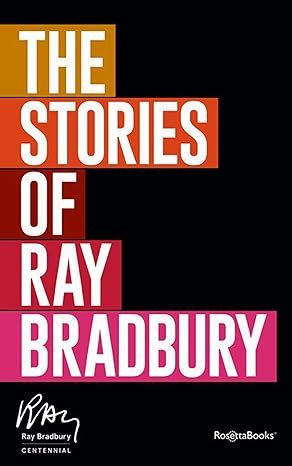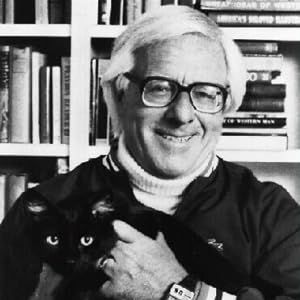The Stories of Ray Bradbury: Introduction by Christopher Buckley (Everyman's Library Contemporary Classics Series)
4.7
-
1,003 ratings
An extensive collection of imaginative short stories by a National Medal of the Arts–winning author of science fiction, fantasy, horror, and suspense.
Fly to Mars and explore the mysteries of the red planet. Journey through time to futures ruled by cold computers and hear the deafening roar of dinosaurs in the past. Sing the body electric and look into the mechanical eyes of androids that want to replace human life as we know it. Visit idyllic landscapes and nostalgic towns that hide sinister secrets. Available in one massive collection for the first time digitally, experience the wondrous mind of Ray Bradbury through one hundred of his all-time greatest tales. These are the stories that ask “What if?,” the stories that make the mind turn, and those that are, in the true spirit of Ray Bradbury, best read under the safety of a blanket.
Featuring works from Dark Carnival (1947), The Martian Chronicles (1950), The Illustrated Man (1951), The Golden Apples of the Sun (1953), Fahrenheit 451 (1953), The October Country (1955), Dandelion Wine (1957), A Medicine for Melancholy (1959), R Is for Rocket (1962), The Machineries of Joy (1964), S Is for Space (1966), I Sing the Body Electric! (1969), and Long After Midnight (1976)—as well as six additional stories available only in this collection—this is the best of Bradbury over numerous decades, thoughtfully compiled from the seminal short story collections that marked his illustrious career.
Kindle
$2.99
Available instantly
Hardcover
$26.39
Paperback
$559.63
Ships from
Amazon.com
Payment
Secure transaction
ISBN-10
0307269051
ISBN-13
978-0307269058
Print length
1112 pages
Language
English
Publisher
Everyman's Library
Publication date
April 05, 2010
Dimensions
5.41 x 1.97 x 8.3 inches
Item weight
2.18 pounds
Popular Highlights in this book
Is there, then, no strength in growing up? no solace in being an adult? no sanctuary in life? no flesh citadel strong enough to withstand the scrabbling assault of midnights?
Highlighted by 119 Kindle readers
I needed that approval. We all need someone higher, wiser, older to tell us we’re not crazy after all, that what we’re doing is all right. All right, hell, fine!
Highlighted by 114 Kindle readers
It was September. In the last days when things are getting sad for no reason.
Highlighted by 80 Kindle readers
Product details
ASIN :
B08KH4TR4Q
File size :
1861 KB
Text-to-speech :
Enabled
Screen reader :
Supported
Enhanced typesetting :
Enabled
X-Ray :
Enabled
Word wise :
Enabled
Editorial Reviews
Review
“The truth is, reading the vast new Everyman’s Library edition of The Stories of Ray Bradbury, culling through its perfectly round 100 selections (and 1,000-plus pages), stopping to wonder why it has taken 30 years for this classic collection to join the hardcover literary canon, a thought slips in repeatedly: Stephen King was thinking way too small. [“Without Ray Bradbury, there would be no Stephen King.” —Stephen King]. Without Ray Bradbury, there wouldn’t be American pop culture.
He is the Shakespeare of American geek culture, which, in effect, is American pop culture. The Waukegan-born writer is a popularizer of ideas so frequently plundered, subjects so unusual yet routinely picked at, reading The Stories of Ray Bradbury becomes a crash course in not just genre but what its modern voice sounds like.” —Christopher Borrelli, Chicago Tribune
About the Author
Ray Bradbury has published more than five hundred works, including The Martian Chronicles, The Illustrated Man, Fahrenheit 451, and Something Wicked This Way Comes. He was awarded the National Medal of Arts in 2004, and the National Book Foundation’s Medal for Distinguished Contribution to American Letters in 2000. He lives in Los Angeles.
Christopher Buckley is the author of fourteen books, including Losing Mum and Pup: A Memoir. He is editor-at-large of ForbesLife Magazine.
Sample
Excerpt. © Reprinted by permission. All rights reserved.
FROM THE INTRODUCTION
By Christopher Buckley
——
In an episode of the hi t TV show Mad Men, set in 1962, one of the characters is skeptical about a planned business trip to the West Coast. He asks his boss in a smug, New York City way, ‘‘What’s in L.A., anyway?’’
The boss, Don Draper, played by Jon Hamm, smiles coolly. ‘‘The Jet Propulsion Lab? Ray Bradbury?’’
It’s a throwaway l ine, a fleeting tip of the hat by Mad Men’s creator, Mat thew Weiner, to the ult imate Writer’s Writer: Ray Douglas Bradbury, who, as I type these words, is one day away from his eighty-ninth birthday here on Planet Earth. (His middle name derives from Douglas Fairbanks, an idol from another era.)
Ray Bradbury published his first short story in 1938, which means that he has been a working author for seventy-one years. He is a self-professed ‘‘sprinter’’ at the short story, rather than a ‘‘marathon runner’’ novelist. It is hard to think of a writer who has done more wi th the short story form than Ray Bradbury. According to his able biographer, Sam Weller,* he has written one every week since he started. By my math, that comes to 3,640. The ‘‘Also by’’ page of a recently published book of his essays, Bradbury Speaks, lists thirty-two titles.
Many writers are prolific. It is perhaps Ray’s influence on other writers – to say nothing of his readers – that sets him apart. It is profound. In the pages of Mr. Weller’s book, you’ll find the tributes and friendships of a diverse group: Bernard Berenson, Christopher Isherwood, Aldous Huxley, Stephen King, Federico Fellini, François Truffaut (who managed completely to screw up the film version of Fahrenheit 451), John Huston (for whom Ray wrote the screenplay to his Moby-Dick), R.L. Stine, Buzz Aldrin (among dozens of astronauts), Walt Disney, John Steinbeck, Charles Laughton, Rod Steiger, legendary editor Bob Gottlieb (who helped to shape many of these stories), Sam Peckinpah, and Steve Martin. I’ll stop there, other than to say this is but a partial list of Ray Bradbury’s fan club.
Glittery names, to be sure, but Ray’s influence runs deeper. Literally, it occurs to me. Whenever I’m on a subway, I’m always curious to see what books – if any – kids are reading these days. And the two books that I routinely see the teenagers reading, intently, are Atlas Shrugged and Fahrenheit 451. The next most-often-sighted book is Dandeli on Wine (1957), which many Bradburians insist is his finest work.
Ray Bradbury has covered the world – indeed, universe – with his themes: small-town America, Mars, fantasy, horror, and science fiction. You could even go so far as to say that we live today in a world that was prefigured by Ray Bradbury. Fahrenheit 451, published in 1953, anticipated an age dominated by television, wall-sized plasma-screen TV, and even Sony Walkman-like devices. One of the most chilling stories in this collection, ‘‘The Veldt,’’ published at the start of the TV era, today reads like an Elijah-like warning against surrendering ourselves to the false Edens of the vast wasteland and its bastard offspring, video games.
There are some ironies here in being warned against all this by one of the most famous writers of science fiction. (He prefers to be known as a writer of fantasy.) But few writers have a crater on the moon named for one of their books (Dandelion Crater, so named by the crew of Apollo 15 ) or have consulted on the U.S. pavilion for a World’s Fair, or on an EPCOT exhibit at Disney World. You’ll learn in Weller’s book that Ray was also the inspiration for the design of a number of leading – brace yourself – shopping malls in America. Then, of course, there is the Ray Bradbury Park in his hometown of Waukegan, Illinois. Ray is that rarity in America: the writer who has made his hometown unequivocally proud.
✽
Any appreciation of Ray Bradbury must begin in Waukegan, where a robotic stork or Martian obstetrician dropped him down the chimney on August 22, 1920. That was the year Prohibition began, the first commercial radio broadcast was made, Harding was elected, and F. ScottFitzgerald married (don’t do it, Scott!) Zelda. Other notable births that year: Isaac Asimov, America’s most graphomaniacal sci-fi writer; and Alex Comfort, author of The Joy of Sex, a book that, like so many of Ray’s, brought great pleasure to a whole lot of people. In 2001, Ray told Salon: ‘‘Why would you clone people when you can go to bed with them and make a baby?’’
The town Ray Bradbury grew up in is very much the Green Town of the Dandelion stories, a number of which are included here. The very first story, ‘‘The Night,’’ begins with, ‘‘You are a child in a small town.’’ And there you are, in a magical and often mystical world of grandparents and pie smells and fireflies and the bang of the screen door. And there are things in the woods beyond. One of the final stories in this collection, ‘‘Farewell Summer,’’ was originally included in Dandelion Wine but was cut. Here it is, and it’s haunting. It will, perhaps, take you back to that summer in your own youth when you realized that it wasn’t going to last, and that there were some seriously scary things out there beyond the woods.
‘‘Grow up?’’ Ray commented once, after sadly watching a boy balk at entering a toy store in Sausalito. ‘‘What does that mean? I’ll tell you: It doesn’t mean anything.’’
There’s a rare note of contempt in that statement, and it’s telling. Ray Bradbury is a sunny, decent, loving, gregarious, generous man, both on the page (at least when he’s not scaring the bejeezus out of you) and in person. The joyousness and zest that he brings to his work – even to the darker works – seem (to me, at least) to arise out of his eternal boyishness. Ray Bradbury has no Inner Child. He has an Outer Child. On the page, he’s Douglas (note the name) Spaulding of the Dandelion stories. Douglas is a Huck Finn: prototypically Midwestern, a rulebreaker, adventurer, and dreamer. (Odd, come to think of it, that nowhere in the literature about Bradbury have I found a single reference to Twain. Perhaps it’s not true, as Ray’s fellow Illinosian Ernest Hemingway said, that ‘‘All modern American literature comes from one book by Mark Twain called Huckleberry Finn.’’) But to paraphrase Hemingway, all literature by Bradbury certainly comes from Buck Rogers, L. Frank Baum, Edgar Rice Burroughs, H. G. Wells, Jules Verne, Edgar Allan Poe, Sherwood Anderson, Herman Melville, John Steinbeck, William Butler Yeats, and of course Giovanni Virginio Schiaparelli.
Who?
Well, okay, I hadn’t heard of him either: the nineteenth-century Italian astronomer who discovered the allegedly manmade channels on Mars (mistranslated into English as ‘‘canals,’’), providing Ray Bradbury with the inspiration for The Martian Chronicles.
The Bradbury Chronicles, 2005.
Read more
About the authors
Ray Bradbury
In a career spanning more than seventy years, Ray Bradbury, who died on June 5, 2012, at the age of 91, inspired generations of readers to dream, think, and create. A prolific author of hundreds of short stories and close to fifty books, as well as numerous poems, essays, operas, plays, teleplays, and screenplays, Bradbury was one of the most celebrated writers of our time. His groundbreaking works include Fahrenheit 451, The Martian Chronicles, The Illustrated Man, Dandelion Wine, and Something Wicked This Way Comes. He wrote the screen play for John Huston's classic film adaptation of Moby Dick, and was nominated for an Academy Award. He adapted sixty-five of his stories for television's The Ray Bradbury Theater, and won an Emmy for his teleplay of The Halloween Tree. He was the recipient of the 2000 National Book Foundation Medal for Distinguished Contribution to American Letters, the 2004 National Medal of Arts, and the 2007 Pulitzer Prize Special Citation, among many honors.
Throughout his life, Bradbury liked to recount the story of meeting a carnival magician, Mr. Electrico, in 1932. At the end of his performance Electrico reached out to the twelve-year-old Bradbury, touched the boy with his sword, and commanded, "Live forever!" Bradbury later said, "I decided that was the greatest idea I had ever heard. I started writing every day. I never stopped."
Read more
Reviews
Customer reviews
4.7 out of 5
1,003 global ratings
Rocketman1973
5
There can be few things as lovely as this ...
Reviewed in the United States on November 3, 2013
Verified Purchase
Autumn came late this year, and it was not long ago that I was sitting in my couch on an afternoon, the windows open, watching the leaves of the trees on my street bend in the first strong winds of the changing seasons. Nostalgia always infects me this time of year. I'm sure that I am not alone. It was then, looking between the window and my bookshelves, that I felt the strong impulse to be reading Ray Bradbury. A few years ago I found an old copy of "Something Wicked this Way Comes," and I was reminded almost from the start of it, what a lovely writer Ray Bradbury has always been. I might say, more accurately, "what a lovely human being," because it infects everything her writes. There is a tenderness and magic to his thoughts, a quiet cadence, as if even the things we most fear are meant somehow to be touched and understood.
So I ordered "The Stories of Ray Bradbury," and a few other hardcover editions of his works. When they arrived I put them high and center on my shelves, between Dickens and Calvino, a few spines down from "The Wind in the Willows." Since then I have often carried this rather hefty volume of stories out of the house with me. I would worry about destroying it, but then I doubt Mr. Bradbury would have wanted that. So I carry it like a child might: jealously and with delight.
I am 40 years old now, though it amazes me that this has happened. It amazes me even more when I think that I am only ten years short of 50. So it has been decades since I read "Dandilion Wine" for my summer reading list. These stories are wonderful. I can imagine no better balm for the nerves than this book. I am carried away almost effortlessly, immediately, and lost completely. Sometimes, it occurs to me, that Ray Bradbury only really writes about the passing of time, but he surrounds that idea with such wonder, with such sadness, with joy and curiosity. Everything he writes seems to pivot on one basic premise: that we were all once children, and since then we have gotten taller.
I cannot recommend this book enough. Buy it. Buy the hardcover if you can afford it. This is something to leave on your shelves, to come to over and over and over again. Ray Bradbury should stand in the American library next to Edgar Allen Poe, Walt Whitman, Steinbeck, and Hemmingway. He is an icon, to be remembered and cherished.
Read more
70 people found this helpful
Ian
5
A must-have for die-hard sci-fi fans and aspiring writers!
Reviewed in the United States on November 22, 2021
Verified Purchase
Ray Bradbury truly is an impressive author not just because of how prolific he is, but because of how committed he is to each of his ideas. As demonstrated by this collection, Bradbury is a jack of all trades, from enthralling sci-fi masterpieces such as "A Sound of Thunder" and "Frost and Fire" to gut-wrenching, very personal pieces like "The Lake."
This particular collection, in itself, is a masterclass of the art and craft of story. For example: in "The Night," a second-person point-of-view puts you in the shoes of a boy in the 1920s, and you feel just as scared as he is when his brother suspiciously doesn't come home on time; and in "There Will Come Soft Rains," the complete absence of living characters captures the bleakness of a fully-operational dwelling place crumbling to the ground in the fallout of nuclear war.
Definitely give this one a look. His stories may not be for everyone, but it is absolutely worth one's time and attention.
Read more
3 people found this helpful
Disco Bunny
5
Gorgeous book, excellent stories...NOT printed in China! Unexpected gem.
Reviewed in the United States on January 21, 2020
Verified Purchase
This collection reminds of the books of my youth (I'm in my early 40s), when I'd go grab a 30-40 year old book from the library and the pages and binding were intact, with plenty of life left in them. Let's just say they don't generally make them like that anymore. The vast majority of the books I purchase for my kids are made in China and can hardly withstand a month, let alone years and years of use. This edition is quite different. I purchased it for the content (the stories speak for themselves), but I was so pleasantly surprised at the quality. I hadn't realized how much book quality had deteriorated until I came across this book. It will certainly last me through my lifetime and probably that of my children. Printed and bound in Germany. Absolutely excellent. If you love Ray Bradbury, get this for your library--you won't be disappointed.
Read more
28 people found this helpful
Gnome du Plumb
5
A Twentieth Century Great
Reviewed in the United States on February 20, 2013
Verified Purchase
The story "The Small Assassin" was first published in 1946. It's a horror story. It owes a great deal to Poe but uses innovations from Hemingway to create immediate reality. I turned to Bradbury a lot as I was writing my novel
2 people found this helpful
Ivy Reisner
5
Well-curated collection
Reviewed in the United States on August 31, 2022
Verified Purchase
Going into this collection, you need to know two things Bradbury seems to hate: Technology, and happy endings.
Many of his works look at the emerging technology (in some cases, this is television) and project some horrid future based on it. The rest just find some other reason for the world to be terrible and the characters to be miserable. All Summer in a Day is the saddest story I remember from childhood. The world of Bradbury's stories is bleak, abysmal, often tyrranical, and over the course of the story, more often than not, things only get worse. I have yet to encounter a story of his where the characters end up happy.
They are also throught provoking, and often there is a layer of story beneath the story. The Veldt is especially interesting because you can read it two ways. Peter and Wendy's VR system (and that really was was the nursery was) suddenly produced physical objects from nowhere, with no hardware by which to do so, and without the inventors or manufacturers knowing it has that capability, or the parents, who didn't even investigate screams in their own home, were nuts. It's a different, even darker story if you question the sanity of these parents and of a psychitrist who claims to have never encountered a fact in his life.
This is a good collection, containing a large number of his most famous, most celebrated works. It's a great introduction and a great addition to the collection of any fan.
The list of stories in this collection:
Drunk, and in Charge of a Bicycle The Night Homecoming Uncle Einer The Traveler The Lake The Coffin The Crowd The Skythe There Was an Old Woman There Will Come Soft Rains (my favorite) Mars Is Heaven The Silent Towns The Earth Men The Off Season The Million-Year Picnic The Fox and the Forest Kaleidoscope The Rocket Man Marionettes, Inc No Particular Night or Morning The City The Fire Balloons The Last Night of the World The Veldt The Long Rain The Great Fire The Wilderness A Sound of Thunder The Murderer The April Witch Invisible Boy The Golden Kite, the Silver Wind The Fog Horn The Big Black and White Game Embroidery The Golden Apples of the Sun Powerhouse Hail and Farewell The Great Wide World over There The Playground Skeleton The Man Upstairs Touched with Fire The Emissary The Jar The Small Assassin The Next in Line Jack-in-the-Box The Leave-Taking Exorcism The Happness Machine Calling Mexico The Wonderful Ice Cream Suit Dark They Were, and Golden-Eyes The Strawberry Window A Scent of Sarsaparilla The Picasso Summer The Day it Rained Forever A Medicine for Melancholy The Shoreline at Sunset Fever Dream The Town Where No One Got Off All Summer in a Day (This story is heartbreaking) Frost and Fire The Anthem Sprinters And So Died Riabouchinska Boys! Raise Giant Mushrooms in Your Callar The Vacation The Illustrated Woman Some Live Like Lazarus The Best of All Possible Worlds The One Who Waits Tyrannosaurus Rex The Screaming Woman The Terrible Conflagration up at the Place Night Call, Collect The Tombling Day The Haunting of the New Tomorrow's Child I Sing the Body Electric! The Women The Inspired Chicken Motel Yes, We'll Gather at the River Have I Got a Chocolate Bar for You! A Story of Love The Parrot Who Met Papa The October Game Punishment Without Crime A Piece of Wood The Blue Bottle Long After Midnight The Utterly Perfect Murder The Better Part of Wisdom Interval in Sunlight The Black Ferris Fairwell Summer McGillahee's Brat The Aqueduct Gotcha! The End of the Beginning
Read more
81 people found this helpful
Top Ray Bradbury titles
View all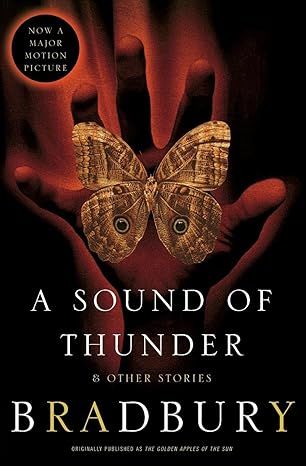
A Sound of Thunder and Other Stories
4.5
-
524
$13.09
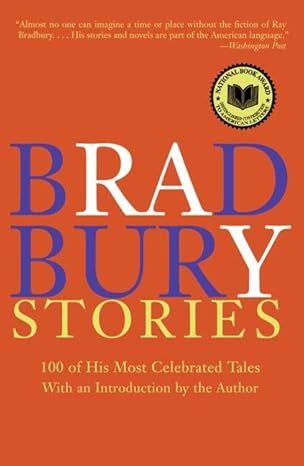
Bradbury Stories: 100 of His Most Celebrated Tales
4.7
-
1,363
$11.60
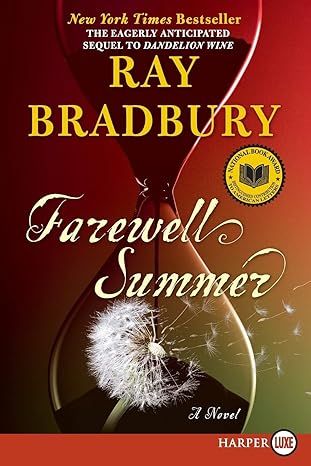
Farewell Summer
4.3
-
731
$0.99
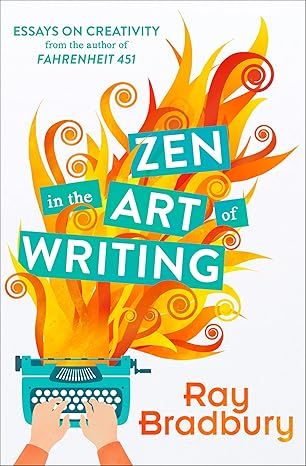
Zen in the Art of Writing
4.4
-
1,527
$14.33
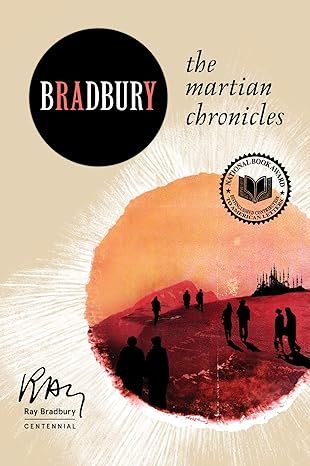
The Martian Chronicles
4.5
-
7,293
$0.99
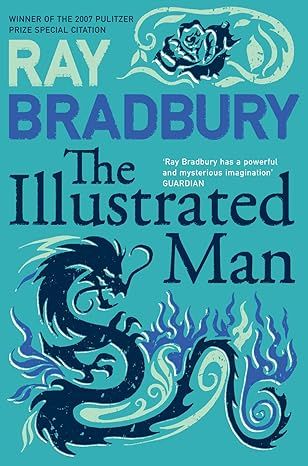
The Illustrated Man (Flamingo Modern Classics)
4.6
-
4,344
$9.31
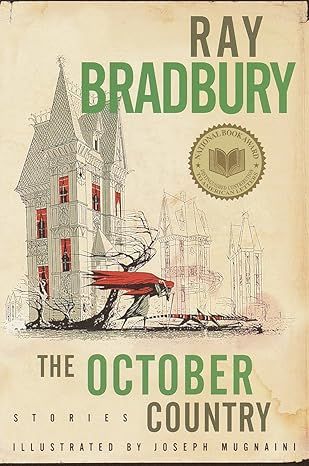
The October Country: Stories
4.6
-
1,736
$12.99
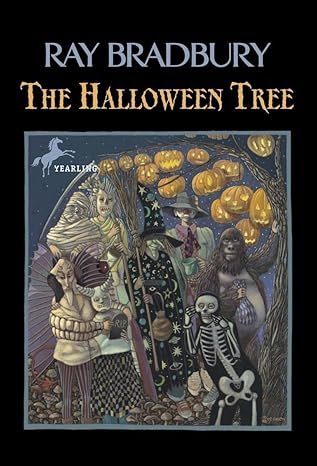
The Halloween Tree
4.6
-
3,112
$1.99

Dandelion Wine (English and French Edition)
4.5
-
3,529
$14.36
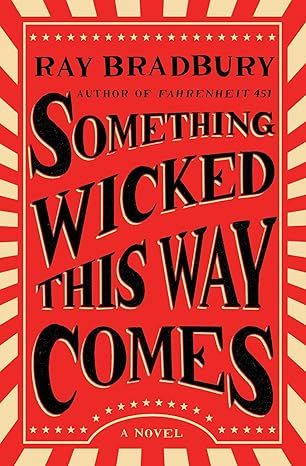
Something Wicked This Way Comes: A Novel
4.4
-
6,928
$0.99

Fahrenheit 451
4.6
-
52,920
$4.68
Best Sellers
View all
The Tuscan Child
4.2
-
100,022
$8.39

The Thursday Murder Club: A Novel (A Thursday Murder Club Mystery)
4.3
-
155,575
$6.33

Sapiens: A Brief History of Humankind
4.6
-
140,302
$13.49

The Butterfly Garden (The Collector, 1)
4.3
-
88,556
$9.59

Things We Hide from the Light (Knockemout Series, 2)
4.4
-
94,890
$11.66

The Last Thing He Told Me: A Novel
4.3
-
154,085
$2.99

The Perfect Marriage: A Completely Gripping Psychological Suspense
4.3
-
143,196
$9.47

The Coworker
4.1
-
80,003
$13.48

First Lie Wins: A Novel (Random House Large Print)
4.3
-
54,062
$14.99

Mile High (Windy City Series Book 1)
4.4
-
59,745
$16.19

Layla
4.2
-
107,613
$8.99

The Locked Door
4.4
-
94,673
$8.53
